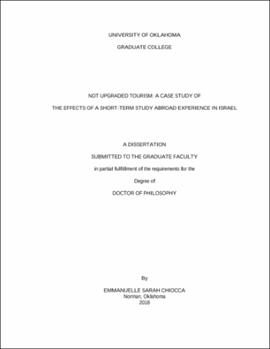| dc.contributor.advisor | Baines, Lawrence | |
| dc.contributor.author | Chiocca, Emmanuelle Sarah | |
| dc.date.accessioned | 2018-06-11T19:03:37Z | |
| dc.date.available | 2018-06-11T19:03:37Z | |
| dc.date.issued | 2018-05-11 | |
| dc.identifier.uri | https://hdl.handle.net/11244/300023 | |
| dc.description.abstract | International education has been evolving in the past decade, with short-term study abroad programs gradually growing to be the dominant type of program. With this growth comes the need to develop a concentrated and impactful curriculum and to provide supportive environments for deep learning abroad that is more than upgraded tourism but rather focused on educational outcomes.
This qualitative case study investigates the experiences of five study abroad participants in Jerusalem and the potential changes they perceive to have undergone during their sojourn, in the hopes of providing insights for international curriculum development. Drawing from multiple data sources within an interpretive framework, such as surveys, documents, observations, and interviews of the participants and their instructor, the purpose of this study is to understand the types of experiences and subsequent change in relation to the curriculum abroad. Data was analyzed inductively and thematically. The findings suggest that the holistic experience was anchored by (1) directed and diverse conversations, (2) hermeneutical reflections, (3) emotional disequilibrium, (4) cross-cultural competence development, and (5) student engagement in a classroom culture, which acted together as a gestalt. Change emerged in the forms of (1) intercultural sensitivity, (2) change as a student, (3) ideological shift, and (4) career refinement.
Findings highlight the connections between experiential learning, intercultural competence development, and perspective transformation. They encourage international educators to provide instructional frames that encourage students to engage with the host culture in critical ways via experiential pedagogy to increase their critical cultural awareness.
Keywords: international education, study abroad, intercultural competence development, intercultural sensitivity, transformative learning, perspective transformation, experiential learning | en_US |
| dc.language | en_US | en_US |
| dc.subject | Education, Curriculum and Instruction. | en_US |
| dc.subject | Education, Educational Psychology. | en_US |
| dc.subject | Education, Bilingual and Multicultural. | en_US |
| dc.subject | Education, Higher. | en_US |
| dc.title | NOT UPGRADED TOURISM: A CASE STUDY OF THE EFFECTS OF A SHORT-TERM STUDY ABROAD EXPERIENCE IN ISRAEL | en_US |
| dc.contributor.committeeMember | Houser, Neil | |
| dc.contributor.committeeMember | Heddy, Benjamin | |
| dc.contributor.committeeMember | Ruan, Jiening | |
| dc.contributor.committeeMember | Reeder, Stacy | |
| dc.date.manuscript | 2018-05-11 | |
| dc.thesis.degree | Ph.D. | en_US |
| ou.group | Jeannine Rainbolt College of Education::Department of Instructional Leadership and Academic Curriculum | en_US |
| shareok.orcid | 0000-0003-4718-9413 | en_US |
| shareok.nativefileaccess | restricted | en_US |
